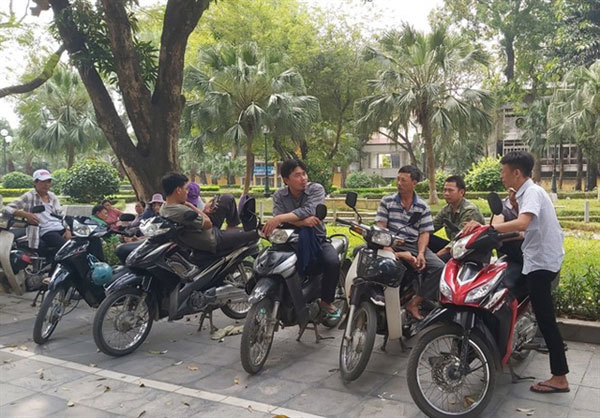 |
| Migrants live in Cư Bung Valley, the Tay Nguyen (Central Highlands) province of Gia Lai in poor condition of no electricity, no clean water, no school, no medical care. — Photo dantri.com.vn |
Gia Lai authorities are reportedly attempting to build a resettlement area to help these people stabilise their lives.
Cư Bung Valley spans about 229ha between Phu Thien District (Gia Lai Province) and Ea H’leo District (Dak Lak Province).
From a distance, Cư Bung is barren land with no trees and locals compare the area to a desert.
There are 79 households with 262 people in the valley, of which 55 households with 181 people migrated from elsewhere in the country to settle down there.
The first internal migrants came to buy land and build houses in 2003, and even more people have arrived since 2012.
Le Van Thinh, 55, from the northern province of Thai Binh, has a 20sq.m-wooden roofed house in the valley.
“My hometown is poor, I don't have farmland so I went to HCM City to work in an industrial zone,” he said. “There, I got married but life is difficult when the daily cost for a family staying in a rented house in the city is too expensive.”
In 2012, he decided to buy 3ha of land in Cư Bung for VND100 million from family savings and loans from friends.
Most people in the valley grow cassava and though they have tried to grow more valuable crops over the years, the dry conditions of the valley have put paid to those efforts.
Thinh said he hopes the Government will help Cư Bung people move to a resettlement area in the near future. “At that time, I will take my wife and children to live together and make a career.”
As life in Cư Bung Valley is difficult with no roads, no electricity, no school, no health centre, no clean water, Thinh lives alone to grow crops while his wife and two children stay in HCM City to study and work.
Vi Van Khai, 28, said: “The most miserable thing here is the lack of water and the barren land.”
“The 300 coffee trees and 300 pepper trees of my family have just died of drought. I have levelled soil to prepare for growing mangoes and high-yield cashew trees.”
No school
Thinh said there were about 40 children aged 7-15 in the areas however, due to the difficulty of travel and family conditions, only 20 go to school.
Khai's seven-year-old daughter had to move with her mother to Eahleo Commune (Eahleo District, Dak Lak Province), 12km from home to study.
“I have rented a small house near the school to facilitate my child's studying,” he said.
“Every Friday afternoon, I pick up my daughter and wife to go home and on Sunday afternoon, I drive my wife and child to the rented house.”
Le Thanh Viet, Chairman of Ia Le Commune’s People's Committee, Chu Puh District, said: “To go to school in Ia Le Commune, children in Cư Bung have to cross 10km of rugged forest roads. Some parents choose a school in Ea H’leo Commune for their children’s studies.”
Most children in the area drop out of education after primary school.
Resettlement area
To help families in Cư Bung have a stable life, Chu Puh District authorities have developed a plan to relocate households to a resettlement area in Ia Brel Village (Ia Le Commune).
According to Le Thanh Viet, Chairman of Ia Le Commune People's Committee, after examination, only 55 households who migrated there were eligible to be moved to the resettlement area.
The remaining households already have houses and land, they only came to Cư Bung to farm, so there are no grounds for them to move to the resettlement area.
Viet said Ia Brel Village’s resettlement area is expected to receive VND5.5 billion ($237,600) from the State budget, and VND550 million ($23,700) from the local budget.
Le Van Thach, deputy head of the Chu Puh District’s Construction Investment Project Management Board, said Chu Puh District authorities spent VND430 million ($18,600) to buy 2.6ha of land in Ia Brel village and requested the Gia Lai People's Committee to approve soon the work of soil levelling and road building.
“Upon hearing about the resettlement programme, people in Cư Bung are very excited and looking forward to moving to the new living place soon,” Vi Van Khai said.
“The new lands will be favourable for children' education, medical care, and especially people will have the best conditions to develop production.” VNS

Internal migrant workers in Hanoi face poverty, danger
Thousands of internal migrant workers from nearby provinces’ rural areas have come to Hanoi to earn livings by working tough jobs full of hardships.

Coffee farms see high yields from new trees
Coffee farms in Kon Tum Province are producing higher yields from new coffee trees and older trees grafter with young shoots.
 After moving there to escape poverty in their hometowns over the years, almost 200 people in Cư Bung Valley, the Central Highlands province of Gia Lai, still live without electricity, clean water, schools and medical care.
After moving there to escape poverty in their hometowns over the years, almost 200 people in Cư Bung Valley, the Central Highlands province of Gia Lai, still live without electricity, clean water, schools and medical care.